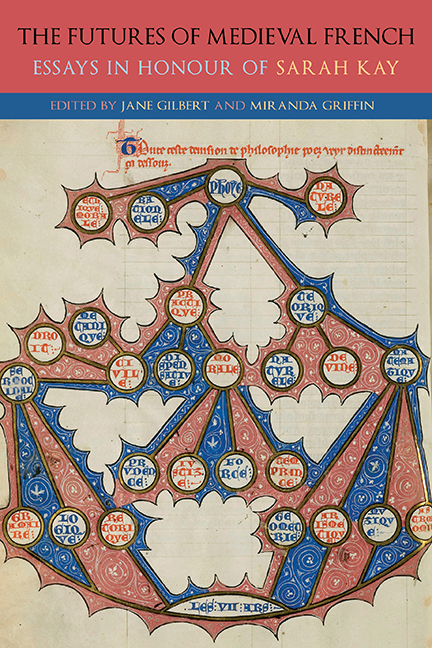Book contents
- Frontmatter
- Dedication
- Contents
- List of Illustrations
- List of Contributors
- List of Abbreviations
- Introduction
- Part I Subjectivity in Troubadour Poetry
- Part II The ‘Chansons de geste’ in the Age of Romance: Political Fictions
- Part III Courtly Contradictions: The Emergence of the Literary Object in the Twelfth Century
- Part IV The Place of Thought: The Complexity of One in French Didactic Literature
- Part V Parrots and Nightingales: Troubadour Quotations and the Development of European Poetry
- Part VI Animal Skins and the Reading Self in Medieval Latin and French Bestiaries
- Afterword
- General Bibliography
- List of Manuscripts
- Bibliography of Work by Sarah Kay
- Index
- Gallica
Connected Literature: Chansons de geste, Burgundian livres de gestes, and the Writing of Literary Theory Today
Published online by Cambridge University Press: 27 May 2021
- Frontmatter
- Dedication
- Contents
- List of Illustrations
- List of Contributors
- List of Abbreviations
- Introduction
- Part I Subjectivity in Troubadour Poetry
- Part II The ‘Chansons de geste’ in the Age of Romance: Political Fictions
- Part III Courtly Contradictions: The Emergence of the Literary Object in the Twelfth Century
- Part IV The Place of Thought: The Complexity of One in French Didactic Literature
- Part V Parrots and Nightingales: Troubadour Quotations and the Development of European Poetry
- Part VI Animal Skins and the Reading Self in Medieval Latin and French Bestiaries
- Afterword
- General Bibliography
- List of Manuscripts
- Bibliography of Work by Sarah Kay
- Index
- Gallica
Summary
HOW MIGHT WE write contemporary literary history from the medieval perspective in the age of world literature? It may seem unexpected, unorthodox, and almost incongruous to do so by taking up the question of the chansons de geste, the French ‘epic’ of the Middle Ages. If that is at all possible, it is because Sarah Kay laid the ambitious groundwork in her 1995 Political Fictions, when she tethered the critical study of individual texts ‘to the wider project of contributing to medieval French literary history by re-examining the relationship between the chansons de geste and romance’ (Political Fictions: 1). She interrogated the neglect (and contempt) of the chansons de geste in favour of the romance genre, showed the mutual connections and influences between the genres, and introduced the radically transformative notion of ‘simultaneity’ of romance and chanson de geste in history, thereby rewriting the traditional linear, genealogical, and teleological discourse of literary history that saw medieval epic literature give birth to romance, orality to writing, and verse to prose. Yet the general perception in the West, despite contestations, is that we live today in the age of romance: the novel, seen as the heir of medieval romance, is the dominant genre of contemporary world literary production and of the world translation market. The epic is squarely seen as a genre of the past. At best, the term may be used today as an adjective to describe, for instance, a narrative quality: a novel or film may thus be qualified as having ‘epic’ proportions. How timely, if at all relevant, then, is the invocation of the epic genre, what is more the medieval European epic, to the articulation of the literary theory of world literature? In other words, how might the task that Kay's book defined for medievalists be extended, beyond the writing of the ‘French literary history’, to world literary history and our future writing of it?
One way in which world literary history has contested this largely Eurocentric claim of the novel's dominance has been to bring in examples from outside the Western literary tradition and to demonstrate the coexistence of the two models of epic and novel throughout history and across the globe (Dimock 2006).
- Type
- Chapter
- Information
- The Futures of Medieval FrenchEssays in Honour of Sarah Kay, pp. 99 - 112Publisher: Boydell & BrewerPrint publication year: 2021



